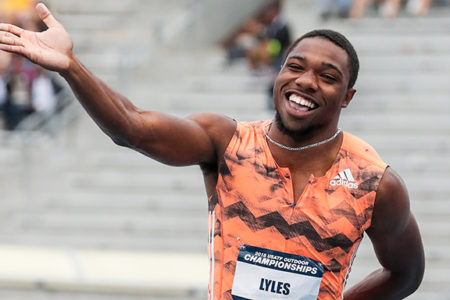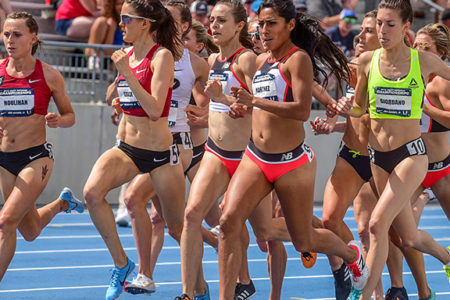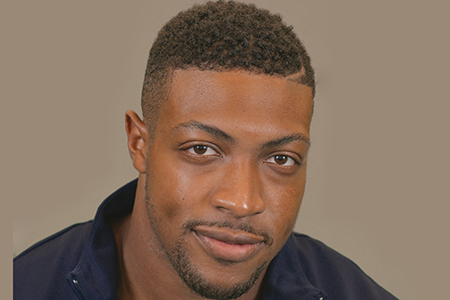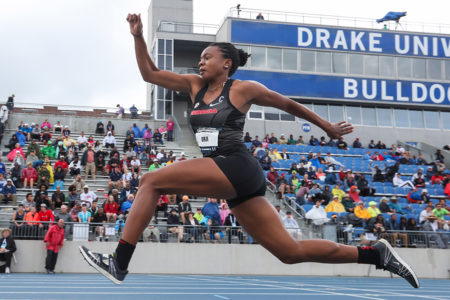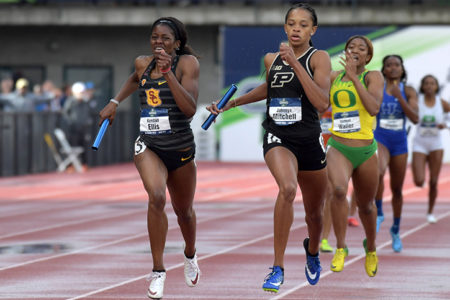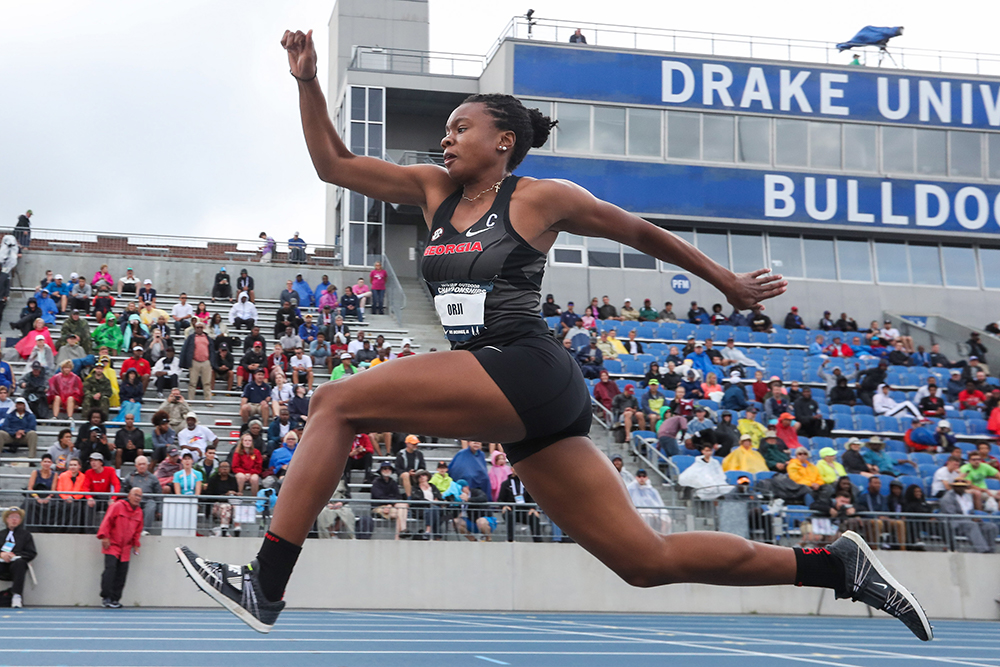
As she faced the scribes and video cameras in Drake’s interview area, Keturah Orji had just finished the domestic season of her life… so far. With a long/triple jump double at the NCAA capping her Georgia career with distinction befitting a 7-time NCAA TJ champion (in and out), she had fought through rain and hail to haul in that last collegiate crown after raising her Collegiate Record at the SEC. Her 20-point haul in Eugene chipped in mightily to the indoor champion Bulldog squad’s 2nd-place finish 1 point behind USC.
Now in a tense contest she had just tilted successfully against Tori Franklin, the U.S. event’s new star who had broken Orji’s American Record from the Rio Olympics, jumping past it twice in a meet in May. To win the national title Orji had to uncork her third-longest jump ever. Her triumph earned her a third straight crown. “I don’t think it’s personal,” Orji said of the duel just completed. “It’s just everyone has marks and you go up against them and you try and beat them. It’s kind of just like that in most competitions.”
Franklin’s arrival and readiness to put her all into unseating the U.S. queen, in fact, had Orji smiling. “It’s really exciting,” she said. “I know a lot of times when I was in high school people would say, ‘Oh, the U.S. triple jump isn’t strong; it isn’t strong, it’s weak.’ A lot of times people wouldn’t come and watch the women’s triple jump either so it’s nice that they show the NCAA women’s triple jump now [on ESPN], and it’s like that’s where you’re competing. We’re just looking to bring a lot more attention to it.”
Had Franklin passed her on her last attempt—the Michigan State alum was close—she had been ready to fight back. “I didn’t know if [Franklin’s 47-6½w] was going to be bigger,” she said. “I thought it was going to be bigger ‘cause the crowd went ‘Ooooh!’ So I was like, ‘OK, I probably have to respond.’ But luckily it wasn’t so I was able to get the win.”
Georgia coach Petros Kyprianou knew Orji would be ready for her first time under pressure from a rival at the Nationals.
“Keturah thrives on competition,” he said. “She does change her technique to better when she has better competition. It’s like an instinct or a mechanism she has. It kind of kicks in when the pressure is on. It’s like the mom lifting the car to save her child, one of those things. She breaks out that super-power and Keturah’s super-power is the ability to hit better positions and be able to apply all her speed and all her power in better positions. That’s what I’m looking forward to seeing more down the road.”
Orji, Kyprianou adds, is also a thorough student of the bounce-three-times discipline: “She’s a very coachable athlete, extremely intelligent, very savvy in her event, she knows everybody and she knows who’s competing. She knows everything and everybody out there that triple jumps far. She watches videos.”
And she is analytical. Her comments when asked how this year’s NCAA and USATF wins compared to each other were clipped: “This was definitely more competition and definitely better conditions than Eugene.” But her assessment of her technique in Des Moines? A full report: “Not spot-on at all. My hop was not extended out enough so I definitely want to work on that. My chest was coming forward on a lot of my phases also. That makes me fall in the pit earlier. And on my landings my feet dropped instead of bringing my feet to my chest. So I have a lot to work on.”
To shape Orji’s technique Kyprianou has used Tatyana Lebedeva—the ’04 Olympic triple jump gold medalist and 3-time world champion—as their model. “Keturah is the American version of Lebedeva, the Russian,” he says. “They’re very similar, they’re very fast. Lebedeva was very fast and she had this nice hop phase where she stretched out very much. Lebedeva was a gymnast when she was little and so was Keturah. So they have the ability to split or open up the hop this much. That’s why Keturah’s technique has changed and become a little more hop-oriented or hop-dominant. It’s about 40%—40/20/40, basically, or 38/22/38 in her three phases as a percentage of the final jump.”
Orji’s arm action in her jump as a prep didn’t fit Kyprianou’s ideal. “So we had to change that and she bought into it,” says the coach. “We put numbers [up as goals]; she loves numbers. And I told her if you do this and this and this on our jumping with a 4-bounds-in-and-jump or your speed bounds or your lifting, if you hit those numbers, those numbers equal to 14.50 or 14.70 [c48ft]. And actually [in ’16 when Orji set her then-AR 48-3¼/14.71 in Rio] we hit every single number and I kind of credit her ability to adjust and chase those numbers, and obviously her competitiveness. In simple words, that’s a very intelligent triple jumper right there.”
As Kyprianou sees it, Orji’s understanding of her primary event—don’t overlook her 22-4¼ (6.81) long jump PR at the SEC—has deepened vastly over four college years since she twice rated as T&FN’s No. 1 high school All-America for Mt. Olive of Flanders, New Jersey.
“I don’t think she was very knowledgable about any technique in high school because, according to her, her coaches in high school were sprint coaches and didn’t know a lot about the triple jump,” he says. “Her coach actually tried to learn a lot from [technique maven] Boo Schexnayder and all that and tried his hardest. So she was very open. And I was kind of lucky.
“Going back to Maicel Uibo [the multi-eventer who won two NCAA deca titles for Georgia], some of his techniques were really good or good enough or he knew a lot about it, so it was difficult for him to make changes as quickly as I would like to. So it took 3 or 4 years for him to change all of them, but for Keturah it changed the first semester. She was very, very good in adapting to new techniques and new ideas and some very high-intensity training.”
With her college years behind her, Orji has signed with manager Hawi Keflezighi (Meb’s brother) and has elite aspirations for her pro career.
“She does want to be the first American to jump 15m [49‑2½],” Kyprianou says, “and as long as she remains healthy and fixes… We’re still far from perfect, but the closer you get to perfect, the closer you’re going to get to 15m. She’s not as physically imposing as Caterine Ibargüen and Yulimar Rojas, who’s like 6-4 [1.93]. But I can say very confidently Keturah is a better technician than both of them. She just doesn’t have their physical ability. We can overcome that with more speed and better technique and better nutrition and all that. She’s definitely a serious candidate for an Olympic medal.”
Orji’s summer competition schedule will open with London’s World Cup on July 14–15. After that, says Keflezighi, she hopes to long jump in any Diamond League meets she can get into. With Rabat—the only remaining DL besides the final with a triple jump—going off just 2 days before the World Cup, Orji does not plan to TJ again until next season.
